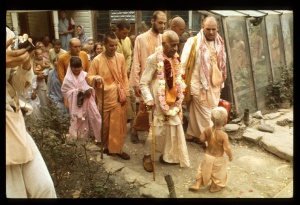SB 10.84.2-5: Difference between revisions
m (1 revision(s)) |
(Vanibot #0018 edit: make synonym terms in Sanskrit italic in SB - Vanisource) |
||
| Line 1: | Line 1: | ||
{{info | {{info | ||
|speaker= | |speaker=Śukadeva Gosvāmī | ||
|listener= | |listener=King Parīkṣit | ||
}} | }} | ||
[[Category:Srimad-Bhagavatam - Canto 10 Chapter 84|s02-05]] | |||
[[Category:Bhagavatam Verses Spoken by Sukadeva Gosvami - Vanisource|108402]] | |||
<div style="float:left">'''[[Srimad-Bhagavatam]] - [[SB 10|Tenth Canto]] - [[SB 10.84: The Sages' Teachings at Kuruksetra|Chapter 84: The Sages' Teachings at Kurukṣetra]]'''</div> | |||
<div style="float:right">[[File:Go-previous.png|link=SB 10.84.1]] '''[[SB 10.84.1]] - [[SB 10.84.6]]''' [[File:Go-next.png|link=SB 10.84.6]]</div> | |||
{{RandomImage}} | |||
{{SBnotice}} | |||
==== TEXTS 2-5 ==== | ==== TEXTS 2-5 ==== | ||
<div | <div class="verse"> | ||
iti sambhāṣamāṇāsu | :iti sambhāṣamāṇāsu | ||
strībhiḥ strīṣu nṛbhir nṛṣu | :strībhiḥ strīṣu nṛbhir nṛṣu | ||
āyayur munayas tatra | :āyayur munayas tatra | ||
kṛṣṇa-rāma-didṛkṣayā | :kṛṣṇa-rāma-didṛkṣayā | ||
dvaipāyano nāradaś ca | |||
cyavano devalo 'sitaḥ | :dvaipāyano nāradaś ca | ||
viśvāmitraḥ śatānando | :cyavano devalo 'sitaḥ | ||
bharadvājo 'tha gautamaḥ | :viśvāmitraḥ śatānando | ||
rāmaḥ sa-śiṣyo bhagavān | :bharadvājo 'tha gautamaḥ | ||
vasiṣṭho gālavo bhṛguḥ | |||
pulastyaḥ kaśyapo 'triś ca | :rāmaḥ sa-śiṣyo bhagavān | ||
mārkaṇḍeyo bṛhaspatiḥ | :vasiṣṭho gālavo bhṛguḥ | ||
dvitas tritaś caikataś ca | :pulastyaḥ kaśyapo 'triś ca | ||
brahma-putrās tathāṅgirāḥ | :mārkaṇḍeyo bṛhaspatiḥ | ||
agastyo yājñavalkyaś ca | |||
vāmadevādayo 'pare | :dvitas tritaś caikataś ca | ||
:brahma-putrās tathāṅgirāḥ | |||
:agastyo yājñavalkyaś ca | |||
:vāmadevādayo 'pare | |||
</div> | </div> | ||
| Line 29: | Line 37: | ||
==== SYNONYMS ==== | ==== SYNONYMS ==== | ||
<div | <div class="synonyms"> | ||
''iti''—thus; ''sambhāṣamāṇāsu''—as they were conversing; ''strībhiḥ''—with women; ''strīṣu''—women; ''nṛbhiḥ''—with men; ''nṛṣu''—men; ''āyayuḥ''—arrived; ''munayaḥ''—great sages; ''tatra''—at that place; ''kṛṣṇa-rāma''—Lord Kṛṣṇa and Lord Balarāma; ''didṛkṣayā''—with the desire to see; ''dvaipāyanaḥ''—Dvaipāyana Vedavyāsa; ''nāradaḥ''—Nārada; ''ca''—and; ''cyavanaḥ devalaḥ asitaḥ''—Cyavana, Devala and Asita; ''viśvāmitraḥ śatānandaḥ''—Viśvāmitra and Śatānanda; ''bharadvājaḥ atha gautamaḥ''—Bharadvāja and Gautama; ''rāmaḥ''—Paraśurāma; ''sa''—with; ''śiṣyaḥ''—his disciples; ''bhagavān''—the incarnation of the Supreme Lord; ''vasiṣṭhaḥ gālavaḥ bhṛguḥ''—Vasiṣṭha, Gālava and Bhṛgu; ''pulastyaḥ kaśyapaḥ atriḥ ca''—Pulastya, Kaśyapa and Atri; ''mārkaṇḍeyaḥ bṛhaspatiḥ''—Mārkaṇḍeya and Bṛhaspati; ''dvitaḥ tritaḥ ca ekataḥ ca''—Dvita, Trita and Ekata; ''brahma-putrāḥ''—sons of Lord Brahmā (Sanaka, Sanat, Sananda and Sanātana); ''tathā''—and also; ''aṅgirāḥ''—Aṅgirā; ''agastyaḥ yājñavalkyaḥ ca''—Agastya and Yājñavalkya; ''vāmadeva-ādayaḥ''—led by Vāmadeva; ''apare''—others. | |||
</div> | </div> | ||
{{SBcollapse}} | |||
==== TRANSLATION ==== | ==== TRANSLATION ==== | ||
<div | <div class="translation"> | ||
As the women thus talked among themselves and the men among themselves, a number of great sages arrived there, all of them eager to see Lord Kṛṣṇa and Lord Balarāma. They included Dvaipāyana, Nārada, Cyavana, Devala and Asita, Viśvāmitra, Śatānanda, Bharadvāja and Gautama, Lord Paraśurāma and his disciples, Vasiṣṭha, Gālava, Bhṛgu, Pulastya and Kaśyapa, Atri, Mārkaṇḍeya and Bṛhaspati, Dvita, Trita, Ekata and the four Kumāras, and Aṅgirā, Agastya, Yājñavalkya and Vāmadeva. | As the women thus talked among themselves and the men among themselves, a number of great sages arrived there, all of them eager to see Lord Kṛṣṇa and Lord Balarāma. They included Dvaipāyana, Nārada, Cyavana, Devala and Asita, Viśvāmitra, Śatānanda, Bharadvāja and Gautama, Lord Paraśurāma and his disciples, Vasiṣṭha, Gālava, Bhṛgu, Pulastya and Kaśyapa, Atri, Mārkaṇḍeya and Bṛhaspati, Dvita, Trita, Ekata and the four Kumāras, and Aṅgirā, Agastya, Yājñavalkya and Vāmadeva. | ||
</div> | </div> | ||
__NOTOC__ | </div> | ||
</div> | |||
<div style="float:right">[[File:Go-previous.png|link=SB 10.84.1]] '''[[SB 10.84.1]] - [[SB 10.84.6]]''' [[File:Go-next.png|link=SB 10.84.6]]</div> | |||
__NOTOC__ | |||
__NOEDITSECTION__ | |||
Revision as of 19:49, 1 December 2017

A.C. Bhaktivedanta Swami Prabhupada
Please note: The synonyms, translation and purport of this verse were composed by disciples of Śrīla Prabhupāda
TEXTS 2-5
- iti sambhāṣamāṇāsu
- strībhiḥ strīṣu nṛbhir nṛṣu
- āyayur munayas tatra
- kṛṣṇa-rāma-didṛkṣayā
- dvaipāyano nāradaś ca
- cyavano devalo 'sitaḥ
- viśvāmitraḥ śatānando
- bharadvājo 'tha gautamaḥ
- rāmaḥ sa-śiṣyo bhagavān
- vasiṣṭho gālavo bhṛguḥ
- pulastyaḥ kaśyapo 'triś ca
- mārkaṇḍeyo bṛhaspatiḥ
- dvitas tritaś caikataś ca
- brahma-putrās tathāṅgirāḥ
- agastyo yājñavalkyaś ca
- vāmadevādayo 'pare
SYNONYMS
iti—thus; sambhāṣamāṇāsu—as they were conversing; strībhiḥ—with women; strīṣu—women; nṛbhiḥ—with men; nṛṣu—men; āyayuḥ—arrived; munayaḥ—great sages; tatra—at that place; kṛṣṇa-rāma—Lord Kṛṣṇa and Lord Balarāma; didṛkṣayā—with the desire to see; dvaipāyanaḥ—Dvaipāyana Vedavyāsa; nāradaḥ—Nārada; ca—and; cyavanaḥ devalaḥ asitaḥ—Cyavana, Devala and Asita; viśvāmitraḥ śatānandaḥ—Viśvāmitra and Śatānanda; bharadvājaḥ atha gautamaḥ—Bharadvāja and Gautama; rāmaḥ—Paraśurāma; sa—with; śiṣyaḥ—his disciples; bhagavān—the incarnation of the Supreme Lord; vasiṣṭhaḥ gālavaḥ bhṛguḥ—Vasiṣṭha, Gālava and Bhṛgu; pulastyaḥ kaśyapaḥ atriḥ ca—Pulastya, Kaśyapa and Atri; mārkaṇḍeyaḥ bṛhaspatiḥ—Mārkaṇḍeya and Bṛhaspati; dvitaḥ tritaḥ ca ekataḥ ca—Dvita, Trita and Ekata; brahma-putrāḥ—sons of Lord Brahmā (Sanaka, Sanat, Sananda and Sanātana); tathā—and also; aṅgirāḥ—Aṅgirā; agastyaḥ yājñavalkyaḥ ca—Agastya and Yājñavalkya; vāmadeva-ādayaḥ—led by Vāmadeva; apare—others.
Translation and purport composed by disciples of Śrīla Prabhupāda
TRANSLATION
As the women thus talked among themselves and the men among themselves, a number of great sages arrived there, all of them eager to see Lord Kṛṣṇa and Lord Balarāma. They included Dvaipāyana, Nārada, Cyavana, Devala and Asita, Viśvāmitra, Śatānanda, Bharadvāja and Gautama, Lord Paraśurāma and his disciples, Vasiṣṭha, Gālava, Bhṛgu, Pulastya and Kaśyapa, Atri, Mārkaṇḍeya and Bṛhaspati, Dvita, Trita, Ekata and the four Kumāras, and Aṅgirā, Agastya, Yājñavalkya and Vāmadeva.